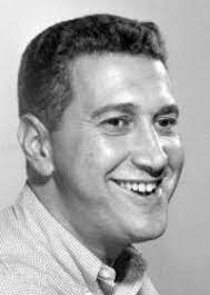| Hy Averback | |
|---|---|
 Publicity Photo of Hy Averback Publicity Photo of Hy Averback | |
| Born | Hyman Jack Averback (1920-10-21)October 21, 1920 Minneapolis, Minnesota, US |
| Died | October 14, 1997(1997-10-14) (aged 76) Los Angeles, California, US |
| Occupations |
|
| Years active | 1947–1992 |
| Spouse | Dorothy Bridges Averback (1949–1997; his death) |
Hyman Jack Averback (October 21, 1920 – October 14, 1997) was an American radio, television, and film actor who eventually became a producer and director.
Early years
Born in Minneapolis, Averback moved to California with his family when he was nine years old. Averback graduated from the Edward Clark Academy Theater in 1938 and eventually got a job announcing at KMPC Beverly Hills before World War II.
Career
Radio
During World War II, as part of the Armed Forces Radio Service, he entertained troops in the Pacific with his program of comedy and music, where he created the character of Tokyo Mose, a lampoon of Japan's Tokyo Rose. After his discharge, his big break came when he was hired to announce the Jack Paar radio show, which replaced Jack Benny for the summer beginning June 1, 1947. He became the announcer for Bob Hope on NBC in September 1948 and announced for other NBC radio shows, The Sealtest Village Store and Let's Talk Hollywood, as well as on the Sweeney and March show on CBS in 1948 and appeared as the voice of Newsweek magazine on a weekly radio show on ABC West Coast stations the same year.
Averback was also an actor, appearing a number of times on the Jack Benny radio show, beginning in January 1948.
In 1952, Averback starred in Secret Mission, a transcribed program "dealing with factual stories of escape from behind the Iron Curtain" on AFRS. In 1955 he joined the ensemble cast of Yours Truly, Johnny Dollar, playing multiple character roles in support of leading actor Bob Bailey.
Television
Doing comedy on early television, he appeared on The Saturday Night Revue (1953–54), Tonight (1955) & NBC Comedy Hour (1956). He was a series regular as Mr. Romero on the Eve Arden sitcom Our Miss Brooks & appeared on I Love Lucy & other 1950s comedies, then moved into directing at the end of the decade. He directed The Real McCoys with Richard Crenna. Crenna had been a cast member with Averback on Our Miss Brooks.
Averback also directed for The Dick Powell Show (1961–1963), Burke's Law (1963-1964), The Man from U.N.C.L.E. (1964–1968), The Flying Nun (1967–1970), Columbo: Suitable for Framing (1971), McCloud (1971), McMillan & Wife (The Face of Murder, 1972), M*A*S*H (1972), Needles and Pins (1973), Quark (1977-1978), the miniseries Pearl (1978), Matt Houston (1982–1983), The Four Seasons (1984), Murder, She Wrote (1985), & The Last Precinct (1986). For CBS, he produced Mrs. G. Goes to College (aka The Gertrude Berg Show) in the 1961–1962 season.
He co-produced the popular 1960s sitcom F Troop and supplied the voice over the loudspeaker heard on the television series M*A*S*H. His actual recording from a Bob Hope show was used in M*A*S*H episode 63, "Bombed," from season 3 where he announces himself as Hope's announcer.
Film
Averback co-narrated The Story of Life, a 62-minute sex educational film, released by Crusader Productions in June 1948. It featured live action as well as animation by former Walt Disney artists Lester Novros and Robert Moore.
Film credits include his acting as Willard Alexander in The Benny Goodman Story (1956) and directing Chamber of Horrors (1966), Where Were You When the Lights Went Out? (1968), I Love You, Alice B. Toklas (1968), The Great Bank Robbery (1969), and Suppose They Gave a War and Nobody Came (1970) as well as the TV movie The New Maverick (1978) with James Garner and Jack Kelly.
Personal life
In 1969, Averback bought a home in the Racquet Club Estates neighborhood of Palm Springs, California,
He died on October 14, 1997, at age 76, and was buried in Westwood Memorial Park.
References
- Kleiner, Dick (November 22, 1992). "Ask Dick Kleiner". The Index-Journal. Greenwood, S.C. p. 51. Retrieved April 23, 2015 – via Newspapers.com.

- Los Angeles Times, January 29, 1939.
- Broadcasting magazine, May 8, 1944
- "The Start of Armed Forces Radio Service". Southwest Museum of Engineering, Communications and Computation. Retrieved 2010-12-28.
- Daily Variety, Aug. 24, 1948
- Daily Variety, May 11, 1948
- 39 Forever, Second Edition, Part 2, by Laura Leff, 2006
- "AFRS Series" (PDF). Broadcasting. November 10, 1952. p. 76. Retrieved April 14, 2015.
- Daily Variety, June 22, 1948
- Meeks, Eric G. (2014) . The Best Guide Ever to Palm Springs Celebrity Homes. Horatio Limburger Oglethorpe. pp. 41–43. ISBN 978-1479328598.
- "Hy Averback, 76, TV Actor and Producer". The New York Times. October 23, 1997. Retrieved June 20, 2020.
- Celebrities in Los Angeles Cemeteries, books.google.ca. Accessed February 27, 2023.
External links
| Directors Guild of America Award for Outstanding Directing – Comedy Series | |
|---|---|
| 1971–2000 |
|
| 2001–present |
|
| Films directed by Hy Averback | |
|---|---|
| Feature films |
|
| Television films |
|
- 1920 births
- 1997 deaths
- 20th-century American male actors
- American male film actors
- American male radio actors
- American male television actors
- American television directors
- Burials at Westwood Village Memorial Park Cemetery
- Directors Guild of America Award winners
- Film directors from California
- Film directors from Minnesota
- Male actors from Los Angeles
- Male actors from Minneapolis
- Male actors from Palm Springs, California
- Radio and television announcers
- Television producers from California